Evangelicals
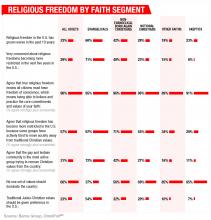
WASHINGTON — Half of Americans worry that religious freedom in the U.S. is at risk, and many say activist groups — particularly gays and lesbians — are trying to remove “traditional Christian values” from the public square.
The findings of a poll published Wednesday reveal a “double standard” among a significant portion of evangelicals on the question of religious liberty, said David Kinnaman, president of Barna Group, a California think tank that studies American religion and culture.
While these Christians are particularly concerned that religious freedoms are being eroded in this country, “they also want Judeo-Christians to dominate the culture,” said Kinnamon.
“They cannot have it both ways,” he said. “This does not mean putting Judeo-Christian values aside, but it will require a renegotiation of those values in the public square as America increasingly becomes a multi-faith nation.”

Much has been made of the "rise of the nones" — that is, the increasing percentage of Americans who identify with no religion. It is a fascinating and undeniable trend, and one that should catch the attention of religious leaders.
I know quite a few Nones. Few of them were raised in the absence of any faith tradition. Instead, most were part of a Christian denomination at some point, but consciously made the decision to leave. What interests me about their stories is this common thread: The majority left Christianity because of the attitudes of a person, and that person was not Jesus. It was an overbearing parent, or a judgmental minister, or a congregant who told them they did not belong because they were gay or they were questioning or they had conflicted ideas. In many cases, it was a combination of these types of influences.
Something is wrong when we drive so many people away. I think a big part of that something is arrogance.
This raises the question, then, of how to be a public Christian, even an evangelical Christian (which is how I identify myself), without running the risk of arrogance.
I don't embody the ideal I'm about to describe in answer to that question, but I know some people who do. These are the people who made me want to be a Christian. What I see in them are three key attributes: They are authentic, unashamed and honest.
IT WAS AS if the poison of the rancorous 2012 campaign had seeped into our social groundwater, tainting family gatherings, Facebook feeds, church coffee hours, and workplace lunch rooms. In my lowest moments I pictured an election-result map rendered with myriad fractures, like windshield glass—a nation of particles and fragments, held together, barely, by begrudging surface tension.
How do those of good will find productive and respectful ways to talk about important civic and moral issues when a significant number of people view their fellow citizens as enemies?
Two recent books, by radically different authors, explore how to stay committed to your principles while reaching out and even finding common cause with those who live and believe differently.
ReFocus: Living a Life that Reflects God's Heart, is by Jim Daly, president since 2005 of Focus on the Family. Faitheist: How an Atheist Found Common Ground with the Religious is by Chris Stedman, the assistant Humanist chaplain at Harvard University and an activist in atheist-interfaith engagement. Daly leads a conservative evangelical institution that has been a major player on the Right in the culture wars of the past three decades (including around what Focus would term the "homosexual lifestyle"). Stedman is a young gay atheist who was once attacked by thugs who shouted Bible verses as they tried to shove him and a friend in front of an oncoming train. And yet both men argue, from both pragmatic and ethical grounds, for actively and respectfully engaging those who hold different beliefs.

Mitt Romney failed in his bid to win the White House back for Republicans, but the biggest losers in Tuesday’s voting may be Christian conservatives who put everything they had into denying President Barack Obama a second term and battling other threats to their agenda.
Instead of the promised victories, the religious right encountered defeat at almost every turn. Not only did Obama win convincingly, but Democrats held onto the Senate – and the power to confirm judges – and Wisconsin elected the nation’s first openly gay senator, Tammy Baldwin.
Meanwhile, Republican senate candidates Todd Akin and Richard Mourdock went down to unanticipated defeat in large part because of their strongly anti-abortion views, and an effort in Florida to restrict abortion failed. For the first time ever, same-sex marriage proponents won on ballots in four out of four states, while marijuana for recreational use was legalized in two out of three states where the question was on the ballot.
Even Michele Bachmann, an icon among Christian conservatives, barely held onto her House seat in Minnesota while Tea Party favorite Allen West lost his congressional district in Florida.
“Evangelical Christians must see the 2012 election as a catastrophe for crucial moral concerns,” R. Albert Mohler, Jr., president of The Southern Baptist Theological Seminary, wrote in a sobering post-mortem.
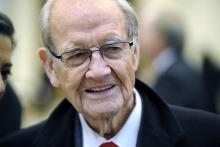
I will miss George McGovern. The former senator from South Dakota and Democratic presidential candidate in 1972 died in a hospice on Sunday, at 90, surrounded by family and friends who loved him.
Indeed, many of us did.
1972 was the first year I was old enough to vote in an election, and McGovern was the first presidential candidate for whom I voted.
To this day, I am more proud of that vote than most of the others I have cast since.
Some of McGovern’s people contacted me while I was still at seminary during the 1972 campaign. They wanted McGovern to have a chance to meet and talk with evangelical Christians, since his own Christian faith was very important to him — being the son of a Methodist minister and even having studied for a divinity degree himself for a while before deciding to go into teaching history. I agreed to help.
They couldn’t understand why most evangelicals at the time were for Richard Nixon, a man who turned out not to be one of the U.S.'s most honest, humble, or deeply religious presidents.
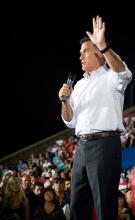
The Romney-Ryan ticket is the first Republican presidential campaign in history without a Protestant candidate, but this hasn't deterred evangelicals from launching massive get-out-the-vote and registration efforts to help Mitt Romney and Paul Ryan win the White House.
Faith and Freedom Coalition founder Ralph Reed, who has been involved in pushing evangelicals to the polls since 1988, has launched what he described as the "largest voter registration, voter mobilization and get-out-the-vote effort ever targeted at evangelical voters," specifically those who would be new additions to the voter rolls.
Reed's effort targets not only presidential swing states but also those with critical Senate and House races to help elect conservatives down ballot as well.
Working with third-party contractors, Reed and his group were able to identify and mail voter registration packets to slightly less than 2 million unregistered evangelicals based on everything from Census data to television preferences to what books they may have purchased online.
"There are millions of Bibles purchased in the United States every month. Most people aren't interested in finding out who is buying those Bibles — I am," Reed said.
Reed said he has a voter file of 17 million evangelicals in battleground states, and each household will be contacted seven to 12 times before the election through mail, email, phone calls and text messages.

WASHINGTON — A coalition of evangelicals is calling on fellow Christians to support access to family planning across the world, saying it does not conflict with evangelical opposition to abortion.
The centrist New Evangelical Partnership for the Common Good released a 15-page document on Monday calling for “common ground” support of family planning and the health of mothers and children.
“We affirm that the use of contraceptives is a responsible and morally acceptable means to greater control over the number and timing of births, and to improve the overall developing and flourishing of women and children,” said the Rev. Jennifer Crumpton, one of the advisers to the evangelical group.
A majority of Protestant pastors plan to vote for GOP presidential nominee Mitt Romney, according to a new survey, but nearly a quarter are still undecided less than a month from Election Day.
Just 17 percent of Protestant pastors said they would vote to re-elect President Obama, with 57 percent favoring Romney and 22 percent undecided, according to a survey conducted by LifeWay Research.
Based in Nashville, Tenn., the research firm is a branch of LifeWay Christian Resources.
The results are remarkably similar to a LifeWay survey conducted in October 2008, which found that 55 percent of Protestant pastors planned to vote for then-GOP nominee John McCain, 20 percent for Obama and 22 percent were undecided.
Since the establishment of The Council for Biblical Manhood and Womanhood in 1987 and J.I. Packer’s 1991 article “Let’s Stop Making Women Presbyters” in Christianity Today, there’s been a resurgence of traditionalist theology among some American churches. Instead of advocating “male headship,” they now promote “complementarianism.” Instead of portraying women as intrinsically “serving, subordinate, and supportive,” they now advocate “biblical womanhood.” But it’s the same patriarchal heresy, just with new language.
Rachel Held Evans, a Tennessee-based evangelical Christian raised in conservative Christian churches, decided to turn the tables. She vowed to take all of the Bible’s instructions for women as literally as possible for a year. A Year of Biblical Womanhood: How a Liberated Woman Found Herself Sitting on Her Roof, Covering Her Head, and Calling Her Husband Master is the often-hilarious, engaging, well-researched, deadly serious result. (You can read all about her adventures at rachelheldevans.com). Former Sojourners editorial assistant Betsy Shirley, a student at Yale Divinity School, interviewed Evans in August 2012.
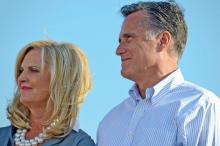
Mitt Romney angered evangelicals during his first White House run in 2008 by blurring the theological lines between their faith and his Mormonism. Lurching in the other direction, he irked them again by scarcely mentioning religion at all during this year’s GOP primaries.
But Romney has finally found some middle ground, evangelical leaders say, by sidelining theology and stressing the “Judeo-Christian values” that he shares with social conservatives.
“He’s made it very clear not to gloss over the theological differences that his faith has with evangelicals,” said Tony Perkins, president of the conservative Family Research Council in Washington. “As long as he talks about the shared values of our religious traditions, I think he’s good.”
Romney did exactly that during a Sept. 9 Meet the Press interview, saying that religion inspired him to run for president — without mentioning the word “Mormon.”
“The Judeo-Christian ethics that I was brought up with -- the sense of obligation to one’s fellow man, an absolute conviction that we are all sons and daughters of the same God and therefore in a human family — is one of the reasons I am doing what I’m doing,” he said.
Conservative Christian leaders are taking the same approach, urging evangelicals to focus on Romney’s policies and principles, not the particulars of his faith.

Mitt Romney has an evangelical problem. Or so we’ve been told by everyone from The New Yorker to The Huffington Post to The Daily Beast. The national media have perpetuated this narrative throughout the election season, and political pundits aplenty have assumed its reliability in their columns and commentary.
But there’s one glaring problem with the storyline: It’s not true.
“Evangelicals say they want a presidential candidate who shares their religious beliefs and they still hold that Romney’s religion is different from their own,” says Robert Jones, CEO of the Washington-based Public Religion Research Institute. “And yet as early as May 2012, shortly after it became clear that Romney was the presumptive nominee,Romney held a 45-point lead over Obama" among evangelicals.
We’ve been told that evangelicals were so skeptical of Romney’s Mormon faith they might not be able to pull the lever for him in the voting booth. But according to Jones’ research, as more white evangelical voters have realized that he is Mormon, his favorability among them has actually risen.
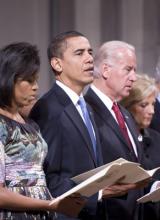
There aren't any white Protestants on the presidential ballot this year — a first in American history.
Instead, the race features two Catholic candidates for vice president, and a Mormon Republican and African-American mainline Protestant for president.
Perhaps lucky for all of them, voters care more about issues such as social justice or gay marriage than they do about denominational brands.
That's particularly true for Republican Mitt Romney and running mate Paul Ryan, who hope to woo evangelical voters that share their values rather than their theology.
It's a situation that probably would have baffled famous evangelicals such as the late Rev. Jerry Falwell, who used the issue of abortion in the 1970s and 1980s to turn evangelicals into a powerhouse voting bloc among Republicans.
"If you had told Jerry Falwell back in 1980 that by 2012 that there would not be a white Protestant on the ticket — he would have died right there," said Shaun Casey, professor of Christian ethics at Wesley Theological Seminary in Washington.

I hadn't a clue that I was on the forefront (apparently) of a huge trend when I got my first tattoo or when, at age 20 while visiting London, I was daring enough to pierce my nose. While sartorially I may fit in, beneath the surface, surrounded by my likewise trendily tatted and pierced friends, I don't fit. In fact I had to stop attending that church because I was tired of feeling as if whom God has called me to be isn't OK.
Even at the very place I had gone to connect with God, I still felt a distant from God's people.
Here's the catch: I am not just your average church attender. I am a young, by all accounts "hip" female pastor. After a couple of years of hard work at a prestigious seminary, I am blessed to be one of the those set apart for ordained ministry. I am, in fact, the preaching pastor at a church in southern California....
I am stuck between two worlds — the evangelical world where I am too liberal (by virtue of my vocation and career) and the mainline Christian world where I often feel disappointed by the lack of passion. I don't think it would be as bad if people in both worlds didn't feel the need to question who I am. But they do.

A professor who was fired in July by the Interdenominational Theological Center says the Atlanta consortium of black seminaries discriminated against his conservative Christian views.
The Rev. Jamal-Dominique Hopkins, an African-American expert on the Dead Sea Scrolls, filed a complaint with the Equal Employment Opportunity Commission in July. He accused ITC administrators of harassment that included “disagreeing with my conservative religious ideals, intimidating me, slandering my character, giving me poor evaluations, and changing student grades from failing to passing with no merit.’’
Hopkins, 42, told Religion News Service that tensions arose after a speaker from InterVarsity Christian Fellowship addressed an informal session he organized in February. During the session, attendees were offered a book that declared homosexuality was a sin.
He said his department chair, the Rev. Margaret Aymer, questioned the distribution of the book and threatened his job.
Writing for Q Ideas, John Morehead examines the 'credibility gap' that evangelcials are facing today:
Evangelicals are having a serious credibility problem in regard to religious pluralism in the public square. This problem is amplified when it comes to Islam in a post-9/11 environment.
Stephen Prothero, in his book Religious Literacy: What Every American Needs to Know – and Doesn’t, documents that most Americans, including Christians, lack the most basic understanding of various religions. This was confirmed in the Pew Forum’s U.S. Religious Knowledge Survey in 2010 where atheists, agnostics, Jews, and Mormons, outperformed “Protestant Evangelicals, mainline Protestants and Catholics on questions about the core teachings, history and leading figures of major world religions.”
Yet this uninformed stance toward other religions has not stopped Christians from forming judgments and taking action on religious issues. After Mitt Romney announced his candidacy for president, many Christians said they would not vote for a Mormon “cult” member. When a Lutheran minister participated in an interfaith memorial service in Yankee Stadium just days after the 9/11 he received emails and letters from those in his denomination accusing him of heresy and terrorism against Christianity. As a result of his work with the Muslim community Rick Warren has been labeled a heretic and promoter of “Chrislam.” And in response to a Hindu offering the opening prayer for Congress, Christians shouted down the religious leader.
If Christians are to overcome this credibility problem, they will have to address the reality of life and faith in the midst of religious diversity. Skye Jethani, Senior Editor of Leadership Journal, has said that if the culture is religiously diverse around us, but the church is not talking about what it means to be a Christian in this environment, then the church will continue to suffer as a result.
Read more here
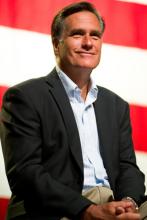
Most Americans who know that Mitt Romney is Mormon say the presumptive GOP nominee’s faith doesn’t concern them. But a new poll indicates there may be an “enthusiasm gap” for Romney among white evangelicals, a crucial GOP constituency.
Sixty percent of Americans know that Romney is a member of the Church of Jesus Christ of Latter-day Saints, according to a survey released Thursday (July 26) by the nonpartisan Pew Research Center. That number has barely budged since March, despite intense media focus on Romney’s faith.
Interestingly, more Americans know that Romney is Mormon than can correctly identify President Obama as Christian (49 percent).
Although most Americans say it is important for a president to have strong religious beliefs, party affiliation -- rather than religion -- drives voter preferences, Pew found.
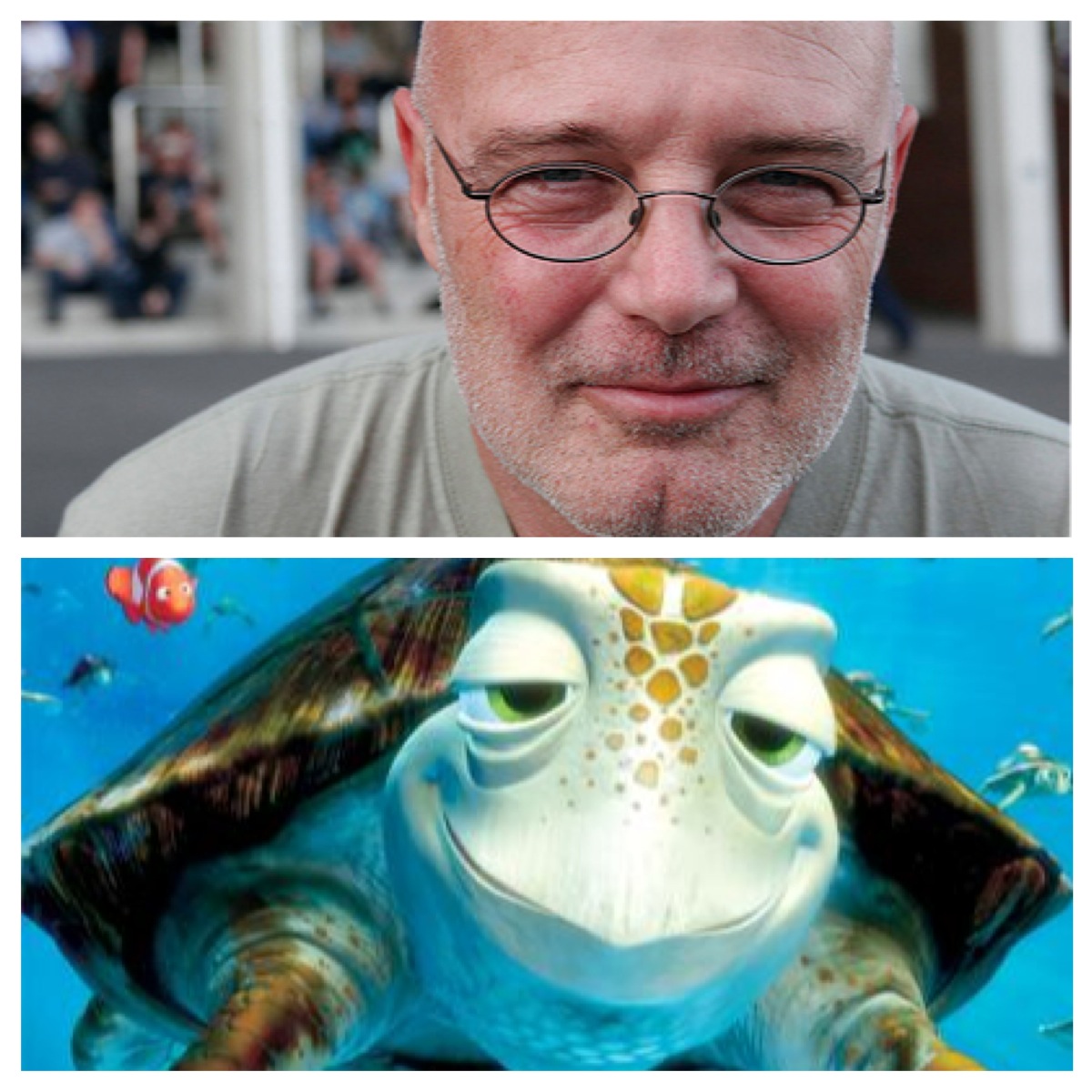
So, you've seen Politicians Who Look Like Disney Characters.
Maybe you've perused Celebrities Who Look Like Historical People and already wasted some time checking out Cats That Look Like Hitler, Men Who Look Like Kenny Rogers or Pugs That Look Like Things.
Today it's our great pleasure to bring you 16 Christian Leaders and Their Cartoon Counterparts, including our buddy Brian McLaren (over there with Turtleman from Finding Nemo), Rick Warren, Rachel Held Evans, Mark Driscoll, John Piper, Rob Bell, God's Politics contributor Shane Claiborne, Pope Benedict XVI, our very own Sojourners Chief Executive Awesomeness Jim Wallis ... and many more.
You're welcome.
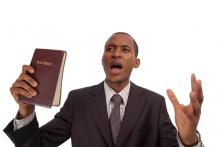
We Christians have a remarkable talent for sticking our feet in our mouths. When searching the words most commonly associated with “Christian,” the list ain’t pretty. I think part of this can be attributed to a handful of phrases that, if stricken from our vocabulary, might make us a little more tolerable. Yes, these things may mean something to you, but trust me, non-Christians don’t share your love for these tried-and-true cliches.
So in no particular order, here are ten phrases Christians should lose with a quickness.

A coalition of nearly 150 religious leaders, led by conservative Protestants, have petitioned the Obama administration to broaden the exemption that allows churches and some religious organizations to avoid a controversial new mandate that all health care insurers provide free contraception coverage.
In a letter sent Monday (June 11) to Health and Human Services Secretary Kathleen Sebelius, the 149 religious leaders note that they hold differing views on “the moral acceptability” of birth control and on the viability of various administration proposals to allow faith-based groups to bypass the mandate for contraception and sterilization coverage.
But they said they share a strong objection to the language that defines which "religious" groups are eligible for an exemption, saying the definition creates a “two-class system” of religious groups: churches, which qualify under the wording of the exemption, and “faith-based service organizations,” which may or may not qualify.
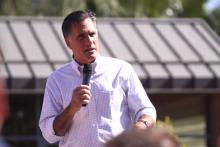
When Romney delivered his “Faith in America” speech in 2007, the Southern Baptist response was to label Mormonism a “theological cult” and “false religion.”
What's surprising in 2012 is the relative lack of anxiety on the other side, among evangelicals who for years considered Mormonism a "cult" that was to be feared, not embraced.
In fact, the relative ambivalence among prominent evangelicals about this new "Mormon moment" -- and the fact that Romney's campaign could mainstream Mormonism right into the Oval Office – could radically shift the dynamics on America's political and religious landscape.